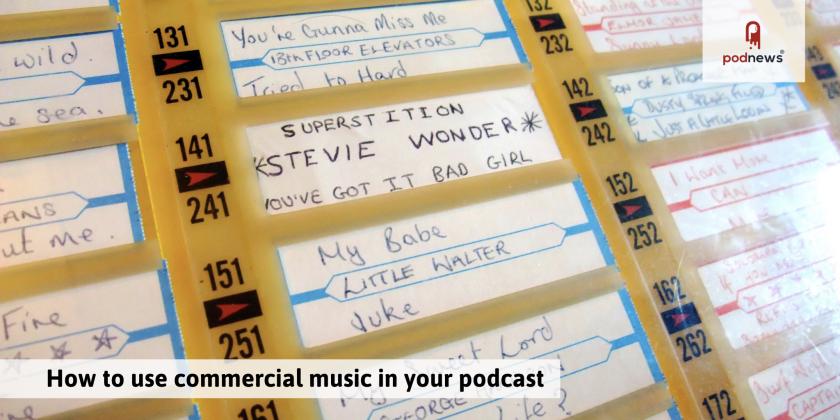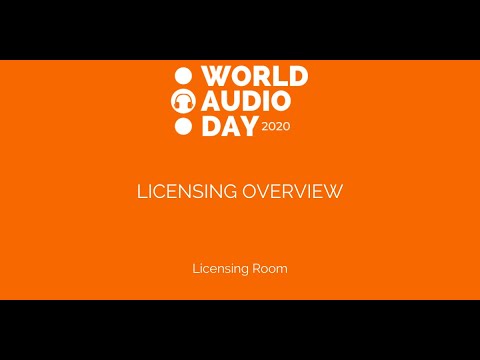
How to use commercial music in your podcast

This article is at least a year old
Can I use commercial music - music from record companies, like AC/DC or The Beatles - in my podcast?
There’s a lot of misinformation about this in internet forums and chat rooms. Here’s the only correct answer: No. No, you can’t.
Without buying a licence. (See below).
But my podcast doesn’t make any money!
No. That doesn’t matter. You don’t have the right to use any commercial music on your podcast.
But it’s fair use!
Well… “Fair use”, or “fair dealings”, is different across the world. It’s an affirmative defence you use in court, which are normally decided on a case-by-case basis. It’s up to you to prove that your use was 'fair’ and not an infringement. If you’ve got that far, you’ve already spent a lot of money in legal costs.
However, two US university professors with specialism in this area have given Podnews a guide on how best to take advantage of 'fair use’. They say that as long as you’re confident it falls under fair use legal interpretation, that is entirely within your rights.
We think you’re best to talking to a copyright lawyer to ensure that your understanding of fair use fits with the law. A simple guide like this is most responsible, in the meantime, by simply saying 'no’.
But I have the permission of the artists!
No. The artists are just one part of the equation; you also need the permission from the record company, from the composers of the music, the publishers of the music, and in many cases a “mechanical” and “sync” right to allow you to copy the material.
The RIAA (who work for US record companies) has shut down podcasts that claimed to have the permission of the artists. It isn’t enough.
And as we were told by a music supervisor, in most cases, an artist they actually can’t give you permission, since they signed a contract with publishers and record companies.
But I’ve bought an APRA mini-licence!
Nah, mate: yeah, nah. This Australian collection agency licence doesn’t cover use of music recordings. What a rort! These blokes aren’t fair dinkum! (etc)
The same may be relevant for other “music licences” you buy in other countries, such as (for example) from PRS for Music in the UK. Ensure that it covers everything you need, including use of the recording.
But it must be possible to get licences from somewhere?
In August 2019, there was news from a company called Podcast Music. Podnews looked at the details in full, and there are many caveats. The biggest of which: right now, no licences are available, more than four years later.
In February 2021, we spoke with songsforpodcasters.com which offers commercially-available music and a global licence for podcasters. This offers more than 10,000 tracks from independent artists, and licences from as low as $55. But the drawback is that you won’t find The Rolling Stones, Adele or AC/DC on songsforpodcasters.com. Instead, the record companies are those that hold all the licences for their work, and who’ve reached agreement with the company. You might not recognise all the music there - but their search engine is good and helps you discover music you might want.
In July 2023, Adam Curry launched a music podcast, called Boostagram Ball. It contains music, and sounds for all the world like a great music radio show. But: the music tracks are all specifically licenced for this use, which allows listeners to pay the artists as they listen; and while you’ll find some banging tunes on the show - or even on our Editor’s show - you’ll probably not recognise very many of them. Not yet, anyway. No Back in Black for you.
But don’t Spotify allow it now?
Spotify announced Shows with Music, which is a way to put full tracks into your show - as long as they play off Spotify.
This is great, and really welcome news. But it comes with a few caveats:
- You can only hear these shows on Spotify - not on any other platform (so it isn’t a podcast really)
- Your listeners can only hear the songs in full if they pay for Spotify Premium
- These shows also have plenty of rules about how much talk you’re allowed to have, and where ads can go
- You need to chop your show up into talky bits, then tell Spotify where a song goes. No talking over the intro.
But I’m using less than ten seconds long and that’s okay isn’t it?
No. There’s no minimum duration under which it’s all okay. Sorry.
What about the BBC? I occasionally hear short clips of music in their podcasts.
Large broadcasters spend millions on their music licensing. Some publishers managed to negotiate some use of short clips of commercial music for podcasts as part of their much larger music licence. Some have spent lots of money with their lawyers working under fair use provisions. Some are probably winging it, knowing that they spend a lot of money on music use anyway. This is unavailable to anyone not already spending millions on music in the first place.
So, I can’t use any commercial music, then?
Not really, no, not without a licence.
Not even a little bit?
No.
What happens if I do?
Well, there’s the RIAA action we mentioned above, in October 2020. They threatened the podcasts with legal action, and, as one of the podcasters pointed out, “if the RIAA actually sues for damages, they will be coming after my personal savings, my retirement, and my house. I can’t afford to put all that at risk.”
In August 2019, we received an email from a podcaster who was chucked off Spotify for using commercial music without agreement. In this case, the podcaster was thrown off, lost all his listeners on Spotify, and was given no warning nor opportunity to appeal. We hear that even if you do have licences for music, Spotify will normally remove your shows anyway; because they’ve different licences of their own.
In November 2019, we revealed a company called Pex which is automatically scanning podcasts for unauthorised music. The company is already successfully being used on social media.
However, in terms of legal action, the reality is that record companies and copyright holders are unlikely to prosecute if it’s not worthwhile for them. Lawyers cost money, after all. There’s plenty of benefit to “making an example” of a high profile podcaster. And plenty of reasons why they’d shrug and look the other way.
Why don’t I just go ahead and do it?
It’s a gamble, because the record companies may just sit and wait for you to be successful, and THEN come after you, maybe two years later, when you can afford it. Here’s an example of Universal Music (in the US) coming after a UK podcaster two years after they were made aware.
But if you have to ask, the answer’s no. Really, it’s no. There’s no getting round it.
But if you go ahead anyway: you might get away with it for a bit; but the bots are coming, and it’s unlikely to be a good plan for long.
But: no.
Where do I buy a licence, then?
With an awful lot of work, you could licence music by working with each part of the chain, but, as is hopefully clear above, it’s not as easy as you think it’s going to be: and your licence is unlikely to be valid everywhere in the world.
We interviewed Winslow Bright, who is a music supervisor that works with production companies to get music licensed. She gives us lots of information about how the process works - and all the intricate permissions you will need.
The Podcast Haven also published a piece about licensing music for a podcast. “Oftentimes it takes some heavy lifting to track down who represents the song and try and negotiate usage with them. The process is a lot of negotiation, contracts, and sorting out the legalities,” the company warns.
Speaking at World Audio Day 2020, here’s media lawyer David Oxenford again, covering the basics as to who gets paid for what uses of music in digital media including webcasting and podcasting. It’s a US-centric look, but may help understand why our advice is, simply, “no”.
So, no music, then?
Oh, wait, we didn’t say that. You can use music. There are plenty of music companies who’ll licence you their own tracks: some based on a licencing period, others as a buy-out. Podnews’s podcast contains bespoke music, composed for us by Studio Dragonfly, as one example. There are composers everywhere who are eager to produce something for you. Use them - or license from a service like songsforpodcasters.com.
As long as you don’t just copy your favourite easy 1990s hit onto your podcast, you’ll be good.
So: yes. But… no.


































































































